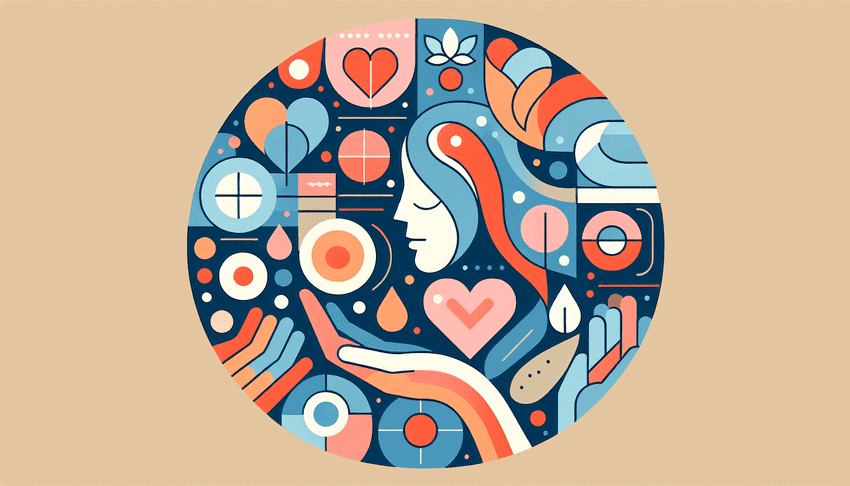Table of Contents
Altruism and Personal Well-being

The Science of Giving: How Altruism Enhances Life Satisfaction
Altruism, the selfless concern for the well-being of others, has emerged as a powerful component in the recipe for a satisfying life. Research in Positive Psychology has provided empirical evidence that helping others not only benefits the recipients but also significantly boosts the happiness and life satisfaction of the giver. Let’s take a closer look at how this act of generosity ignites a positive feedback loop in our lives.
The Altruistic Feedback Loop
What happens in our brains when we commit an altruistic act? Neuroscientific studies have found that performing acts of kindness releases endorphins, the brain’s natural mood elevators, which leads to something known as the ‘helper’s high’. This rush of positive emotion might incentivize us to continue such behaviors, creating a cycle of giving and happiness.
- Engagement in prosocial behavior has been closely linked to lower levels of stress and an enhanced sense of social connectedness, factors which are both integral to emotional well-being.
- Altruistic actions, whether small gestures like compliments or large ones such as volunteering, can foster a sense of meaning and purpose in life.
- Studies have shown that altruism can lead to better physical health, perhaps due to its ability to counteract the negative effects of stress.
Real-World Impact of Giving
Beyond the laboratory, the impact of altruism on life satisfaction can be seen in varying contexts around the world. For instance, consider the ‘Pay It Forward’ initiative, which encourages people to perform random acts of kindness without expectation of reciprocation. Instances of this simple concept have not only spread joy but also created a ripple effect of generous acts within communities.
On a larger scale, volunteerism is a profound example of Altruism in action. People dedicating time and effort to causes they care about report greater life satisfaction and a deeper connection to their community and the world at large. A study of retirees found that those who volunteered were less likely to develop high blood pressure, a key indicator of health and longevity, than those who did not volunteer.
Altruism and Social Connection
Altruism also plays a crucial role in strengthening social ties, which are essential for mental and emotional health. When we help others, we signal our willingness to cooperate and support those in our community. This behavior not only strengthens existing relationships but can also foster new ones, further enriching our lives.
Groups that emphasize collaborative efforts and compassionate support, such as mutual aid societies or social movements founded on shared values, demonstrate the collective power of Altruism to transform lives and entire communities.
The evidence is clear: Altruism is not just a moral virtue but also a viable pathway to individual well-being and societal harmony. By integrating selfless actions into our daily lives, we can reap the benefits of enhanced life satisfaction and construct a more compassionate world. As we continue to extol the virtues of Emotional Intelligence and personal growth, it’s crucial to remember that sometimes we find the greatest fulfillment in turning our focus outward, to the needs of others.
Long-Term Effects of Altruistic Living on Mental Health
Living with an altruistic spirit, where one’s actions are dedicated to the well-being of others, can have profound and lasting impacts on mental health. Research indicates that those who engage in generous behaviors experience numerous psychological benefits, creating a compelling case for the cultivation of selflessness as a lifestyle choice.
One of the key Psychological Benefits Giving has to offer is related to stress reduction. Longitudinal studies have traced the habits of individuals who regularly engage in charitable activities and found a correlation between these actions and lower levels of cortisol, the body’s stress hormone. This suggests that the act of giving may serve as a buffer against the physical and psychological effects of stress.
Moreover, Altruism and Happiness are intrinsically linked. Data shows that individuals who prioritize helping others often report higher levels of life satisfaction and well-being. This sense of fulfillment is not just fleeting; it can lead to a sustained state of happiness, underscoring the lasting impact of generosity.
The Generosity Impact is further observed in the realm of mental health disorders such as depression. Studies suggest that those who live altruistically have a lower incidence of depression and other mood disorders. The connection lies in the sense of purpose and community involvement that charitable acts foster, which are known protective factors against mental health issues.
Delving into the Emotional Rewards Giving brings, neuroscience has uncovered that acts of kindness are associated with the release of the hormone oxytocin. This hormone enhances social bonding and can heighten feelings of warmth and connection, potentially leading to a more positive outlook on life.
Charitable Acts Joy is not just a fleeting sensation, but a profound existential joy that can arise from knowing one has made a meaningful contribution to someone else’s life. The fulfillment and purpose derived from such acts have been found to be more sustainable sources of happiness than many individual pursuits aimed at self-gratification.
The long-term effects of such a lifestyle are evident not just in individuals, but also in community dynamics. Cultures that emphasize communal support and altruism often have stronger social bonds and collective resilience, further emphasizing the role of giving in mental health.
In examining the totality of these benefits, it is clear that a life geared towards altruism is not only noble in its intentions but scientifically validated as a pathway to personal and communal happiness. As we consider the wide-ranging implications of our lifestyle choices, integrating the practice of generosity could be instrumental in fostering a healthier, more resilient society.
Generosity and Emotional Growth

Emotional Intelligence through Generous Actions
Altruism, the selfless concern for the well-being of others, is not just an admirable trait; it’s a pathway to enhancing one’s Emotional Intelligence. The practice of generosity is intrinsically tied to empathy, self-awareness, and emotional regulation—key components that define Emotional Intelligence.
The Interplay of Empathy and Altruism
- Empathy, the ability to understand and share the feelings of another, is at the heart of Altruism. When we act altruistically, we step into the shoes of others, we feel with them, and respond to their needs. This emotional resonance paves the way for emotional attunement and connection.
- In practicing Altruism, individuals often encounter a diverse range of emotions in the people they help. This variety acts as a live training session for the empathetic muscles, building a robust Emotional Intelligence.
Self-Awareness Amplified Through Generosity
Engaging in altruistic acts regularly encourages individuals to reflect on their own emotions and motives. This self-reflection is a pivotal element of self-awareness, which is foundational to Emotional Intelligence.
- As we give, we also subconsciously evaluate our own internal state. Why are we helping? What does this say about us? These questions guide us to a deeper understanding of our values and beliefs.
- Generous actions provide a mirror reflecting our emotional landscape. Through Altruism, givers become more attuned to their emotions, an essential step in nurturing Emotional Intelligence.
Emotional Regulation Through Acts of Kindness
The act of giving can evoke strong positive emotions, sometimes even more intense than those received. However, Altruism also exposes us to challenging situations where emotional regulation is key.
- When facing the suffering of others, maintaining composure and providing help requires the ability to manage one’s emotional responses effectively. Altruism thus becomes a practice ground for Emotional Intelligence.
- By regularly navigating these emotional dynamics, individuals learn to regulate their feelings, a mastery that translates to various aspects of life, furthering their overall Emotional Intelligence.
In conclusion, the intersection of Altruism and Emotional Intelligence is profound. Every altruistic deed is a step towards becoming more emotionally intelligent. The empathy involved in understanding others’ emotions, the self-awareness sparked by reflecting on our motives, and the emotional regulation necessary for managing diverse emotional responses all enrich our Emotional Intelligence.
Psychological research underscores the role of Altruism in Emotional Intelligence development. For instance, studies have shown that people who engage in volunteer work exhibit higher levels of empathy and are better at recognizing and managing their emotions.
Narratives from real-life heroes of charity and community support solidify this evidence. Their stories often depict intense journeys of emotional growth spurred by selfless giving. Thus, Altruism is not only a virtue that benefits the receiver, but it’s an investment in the giver’s emotional evolution, crafting a more interconnected and emotionally intelligent society.
Building Resilience: The Role of Generosity in Overcoming Adversity
Altruism, the selfless concern for the well-being of others, is a quality that binds societies and builds strong communities. While it is widely revered for its noble nature, altruism also plays a pivotal role in building individual resilience, enabling us to weather the storms of adversity with greater tenacity and strength. The act of giving, rooted in altruism, goes beyond mere charity; it is a powerful tool that fortifies the giver’s psychological defenses.
The Psychological Benefits of Generosity
- Enhanced Sense of Purpose: Engaging in altruistic acts provides individuals with a sense of meaning and purpose. It is this purpose that acts as an anchor during times of turmoil.
- Increased Feeling of Control: Altruism can give givers a sense of control over their environment when contributing to the welfare of others, countering feelings of helplessness that often accompany adversity.
- Social Connections: Acts of generosity foster social connections and a support system that can provide aid and comfort during difficult times.
In the realm of positive psychology, it has been demonstrated that altruism activates reward centers in the brain, leading to a myriad of emotional benefits. This ‘helper’s high’ can play a critical role in coping strategies when an individual is faced with stressful situations.
Altruism in Action: Real-Life Resilience
Imagine the story of Emily, a cancer survivor whose experience with illness spurred her to volunteer at a cancer support group. The altruistic decision to share her story and comfort others gave her life a renewed sense of direction and connection, bolstering her own mental resilience in the process. Her engagement with altruism not only eased the challenges for those battling cancer but also empowered her to maintain a positive outlook, despite her personal health battles.
Furthermore, consider the case of a community struck by natural disaster. Amidst the chaos, individuals who stepped forward to help neighbors rebuild homes, shared resources, and provided emotional support found that their altruistic actions created a buffer against despair. In contributing to the recovery efforts, they also recovered a part of themselves, reinforcing their mental fortitude.
Altruism, as evidenced by these examples, transcends the act of giving and becomes a pathway for regaining strength and resilience. It is an expression of our mutual dependence and inherently social nature.
To cultivate a resilient psyche, we must understand the role of altruism in our lives. Its effects are profound and far-reaching—benefitting receivers and givers alike. In the face of adversity, the choice to act generously can transform the daunting journey of struggle into a shared narrative of hope and collective empowerment.
By embracing the power of generosity, we can ensure that when adversity strikes, we are not rendered powerless. Instead, we gain the capacity to face challenges with grace, persevere with steadfastness, and emerge with a strengthened spirit, ready to aid others in their moments of need.
Summary
Altruism, when we reach out selflessly to aid others, not only graces our lives with purpose but remarkably enhances our well-being. This virtue, rooted deeply in Positive Psychology, has proven its worth as a robust ingredient in the recipe for satisfaction and resilience. Research has enthusiastically confirmed that the giver in the altruistic equation often reaps the most benefit, highlighting the beautiful symmetry in the acts of generosity.
Neuroscience offers us a glimpse into the mechanics of our brain when we engage in altruism. The release of endorphins during these acts triggers a ‘helper’s high’, a state of elation that encourages the perpetuation of kindness. This biological response is part of a positive feedback loop, where the joy of giving promotes continued generosity, fostering a harmonious cycle of happiness.
- Altruistic behaviors are linked to reduced stress levels, asserting a protective effect on our mental health.
- The meaningful connections forged through selfless acts bolster our sense of belonging and community.
- A generous spirit can translate to physical health benefits, combating the toll stress can take on our bodies.
Empirical Evidence of Altruism’s Impact
From the ‘Pay It Forward’ phenomenon to global volunteering efforts, the real-world impact of altruism on life satisfaction is tangible and transformative. Those who give their time and resources report not only an enriched personal life but also a stronger bond with their community and the world. A compelling study among retirees even revealed volunteering to be associated with lowered blood pressure, a key health indicator.
Altruistic Behaviors and Health Outcomes
The act of giving has been linked to healthier lifestyles and a more vigorous immune response. With reduced stress comes a diminished load on the body’s systems, paving the way for enhanced health. Instances of chronic diseases and mental health problems are lower among those who engage in community service and selfless deeds.
- Everyday heroes like Sarah and John demonstrate the stress-buffering and immunity-boosting effects of volunteering.
- Research underscores the link between altruistic lifestyles and longevity, suggesting people who help others may live longer, healthier lives.
Generosity and Emotional Intelligence
Altruism not only nurtures our physical health but also enriches our Emotional Intelligence (EI). The act of understanding and sharing the feelings of others requires empathy, a crucial facet of EI. As we practice altruism, we naturally train our empathy, promoting an emotionally intelligent and connected society.
- Engaging selflessly with others fosters a deep self-awareness and emotional regulation, both key components of EI.
- Generosity offers an opportunity for personal growth, enhancing our ability to navigate life’s emotional complexities.
Altruism as a Resilience Builder
In the context of adversity, altruism acts as a psychological shield. It offers a renewed sense of control, a network of social support, and ultimately, cultivates resilience. The fortification this provides to our mental state is priceless. Altruism effectively equips us with the strength to face life’s challenges and the grace to assist others in their time of need.
Embrace altruism and witness the tapestry of benefits it weaves into your life, reflecting the profound interconnections between selfless concern, happiness, health, and resilience. The evidence is profound: by giving, we enhance not only the lives of recipients but also etch a path towards a healthier, more emotionally intelligent, and resilient existence for ourselves.
FAQ – The Joy of Giving
How does engaging in altruistic behaviors and acts of generosity impact an individual’s mental health and overall well-being?
Engaging in altruistic behaviors and acts of generosity has been shown to enhance an individual’s mental health by fostering a sense of connectedness and purpose, releasing endorphins that provoke what is often called a ‘helper’s high.’ This practice of selflessness is a cornerstone of positive psychology, as it often leads to a more profound sense of well-being through increased social support, reduced stress and depression, and a strengthened sense of community—all vital ingredients in the recipe for a happier life. Practical examples include volunteering at local shelters or assisting a neighbor in need, where the positive feedback loop of giving and gratitude profoundly enriches both the giver’s and receiver’s life experiences.
How does engaging in altruistic behaviors influence an individual’s mental health and sense of well-being?
Engaging in altruistic behaviors can significantly boost an individual’s sense of well-being by enhancing their social connections and providing a deep sense of purpose and satisfaction. As documented in numerous studies within the field of positive psychology, helping others triggers the release of endorphins—often referred to as the ‘helper’s high’—and can reduce stress, combat depression, and lead to a longer, happier life. Practical examples from everyday life include volunteering for community service, which not only betters society but also fosters personal growth and happiness in the volunteer.
How do altruism and generosity contribute to an individual’s mental health and overall psychological well-being?
Altruism and generosity can significantly enhance an individual’s mental health by fostering a sense of connection and purpose, as engaging in acts of kindness triggers the release of mood-boosting neurotransmitters such as oxytocin and serotonin. Furthermore, helping others can create a positive feedback loop known as the ‘helper’s high,’ which not only improves overall psychological well-being but can also redirect focus away from one’s own troubles and foster a greater sense of gratitude and contentment in life.




